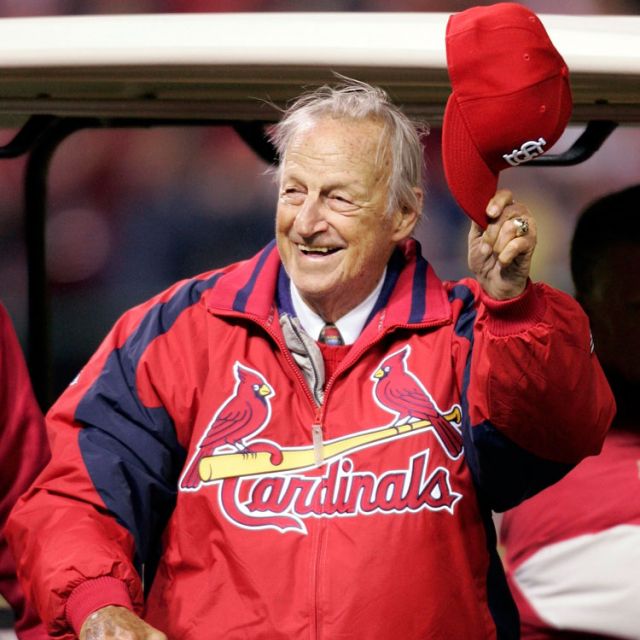Baseball’s spring training is not far off, and our Catholic “spring training” — the discipline of Lent — is fast approaching too. Not a bad time to think about baseball and virtue, which was brought to mind by the recent death of Stan Musial, one of the greatest ballplayers of all time.
Musial dominated the 1940s and 1950s, winning seven batting titles, three National League MVPs and winning the World Series three times. Even today, 50 years after his retirement in 1963, he remains second all-time for total bases, behind only the incomparable Hank Aaron, and fourth in all-time hits, behind Pete Rose, Ty Cobb and Aaron. He died at age 92, predeceased last year by his wife of 72 faithful and faith-filled years. His funeral was in St. Louis, at which a young boy who wanted to be like Stan Musial when he was growing up in that proud baseball city, Timothy Dolan, now cardinal archbishop of New York, was present to honour a Catholic disciple who tried to go to Mass every day.
In a eulogy given by another proud St. Louis baseball man, a moving story was told about Musial’s quiet holiness. Bob Costas, perhaps the most gifted broadcaster in sports, recalled an occasion in which Mickey Mantle, the great Yankee of the 1950s and 1960s, was visiting in his retirement. Costas invited Stan Musial to dinner and told Mantle who was coming. Mantle, a long-time alcoholic, told Costas: “I don’t know how I am going to do it, but I am not going to have a drink all day tomorrow or all evening. I don’t want to do anything foolish in front of Stan Musial.”
Tens of thousands wanted to be like Stan Musial the ballplayer. Mantle, who was almost as good as Musial on the diamond, knew that he ought to be like Musial the man.
“Stan was a better player than me, because he was a better man,” Mantle told Costas.
There are few decisions men, especially young men, make that are as important as choosing their friends. Perhaps the greatest compliment a man can receive is that which Mantle gave Musial — I don’t want to do anything foolish, anything unworthy, anything sinful in front of him.
Mantle spent most of his life choosing his friends unwisely. Perhaps because of all the scandals, movies were made of his life. Musial’s life was too simple, too honourable, too pious for Hollywood. One of the best of the Mantle films, perhaps the greatest of all baseball films, is 61*, a Billy Crystal film about the 1961 home run chase between Mantle and Roger Maris.
“Maris, the North Dakota homebody who has just won the 1960 Most Valuable Player award, sees that Mantle, the Oklahoma hellion who might have been the greatest player ever had he not blown out his knee in the 1951 Series, is risking both his own and the team’s success by his compulsive boozing and wenching,” wrote George Weigel, papal biographer and accomplished baseball fan, about a key scene in 61*.
“So Maris and his apartment-mate, outfielder Bob Cerv, invite Mantle to move in with them, cut out the nocturnal craziness, and get himself back together,” Weigel continues. “That act of solidarity, matched by the way manager Houk and Maris’s teammates rally around him when both fans and sportswriters choose Mickey over Roger in the Great Bambino Record Chase, exemplifies the distinctive way men can be friends. Mickey Mantle, a tortured spirit, died in 1995 after telling a press conference, ‘Don’t be like me. God gave me the ability to play baseball and that’s what I wanted to do. God gave me everything and I just wasted it.’ ”
Weigel concludes with the contrast: “Maris died in 1985 of Hodgkin’s lymphoma and is buried in his hometown, Fargo. This unassuming family man, who never took advantage of the lifestyle libertinism that Gotham (and the journalistic conventions of the era) made possible, was a good husband and father who endured hate mail and death threats, fan idiocies and press barbs. Roger Maris, a Catholic whom some would argue is the real single-season home run king, is one of the quiet heroes of the American Catholic experience.”
Little boys like Tim Dolan in St. Louis look for heroes at the ballpark. Grown-ups realize that the men on field are often not heroes at all. But sometimes they are, and sometimes even a grown-up cardinal of the Holy Roman Church finds a hero there. Stan Musial was a quiet Catholic hero. As Mickey Mantle might have said: “Be like him.”
(Fr. de Souza is the editor-in-chief of Convivium, a Canadian magazine of faith in our common life: www.cardus.ca/convivium.)


